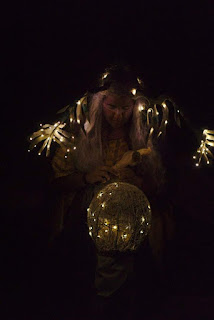[Nevertheless] The Bird was Hope
We like to think of the bird as a blessing - a bird of hope, of peace, a harbinger of good things to come. And good things did come, in the form of three amazing performances of this Spirit-filled play.
Meira, held prisoner in a well, lives a life of faith-filled freedom as she stays true to her beliefs and years to share the Story with others. Omri, hearing Meira's words, battles internally to discern what was true, noble, reputable, authentic, compelling, and gracious as she navigates the culture in which she lives, which seems at odds with the Story.
Neri sees himself as strong, perhaps the strongest, no matter his insecurities or what others think about him. Shai just wants everyone to get along, to listen to the elders, to welcome visitors, to help others, and she lives out these values by welcoming Traveler to visit with her tribe, despite the protests of Neri and others.
Hadara and Batya live lives of radical love, compelled by the Story, sharing it through actions as well as words, sure that even the littlest of horns can save the world.
Rebek, ancient and fading, unsure of how the old ways could mix with the new, is helped along by his apprentice, Uri, distracted teen with good intentions and brewer of medicinal teas who believes that one can serve more than one tribe and still be faithful to their own. Asher, who comes to Rebek to fix her horns again and again, inflates and preys on others' weaknesses to boost her own image and cover her mistakes and lies.
Amani, yearning to fit in and not seeming to love or accept himself for who he is, takes on the aspects of others in order to recreate himself into someone better, much to the horror and disappointment of Yule, the embodiment of what it means to live in true community, one part of the body, working together, celebrating their differences as they all work for good.
Gefen, feeling unappreciated, misunderstood, and perhaps even outcast from his own tribe seeks council of the wise and powerful Ozora, who twists situations, words, and the Story to suit her own needs and wants.
The members of the tribes of Rhetta (white), Draki (green), Anko (purple), and Umami (red) prepare for the Festival of Horns, where they shed and celebrate a year's growth in preparation for a new year. There are conflicts, fights, lies; shadows battled. And there are moments of inspiration, learning, growth, and real community.
In the end a sacrifice is made and a prisoner set free - at great cost, but out of the kind of radical love only found in the Story - only known about because of the Story.
"You know how the Story ends..."
This story, the Story ... they end in hope. Hope that all can be welcome, all can be loved, all can be a unique and essential part of community, all can be forgiven, all can be set free with this radical love...and that there will be people who continue to share the Story and the love and the hope with others.
The bird was indeed a harbinger of good things to come. If just one actor, one audience member, overreacted to the bird in the theater, it all could have gone wrong, nevertheless our minds were filled with the best, not the worst; things to praise not things to curse; with a kind of belief that everything would work out for good.
The bird was hope.













Comments
Post a Comment